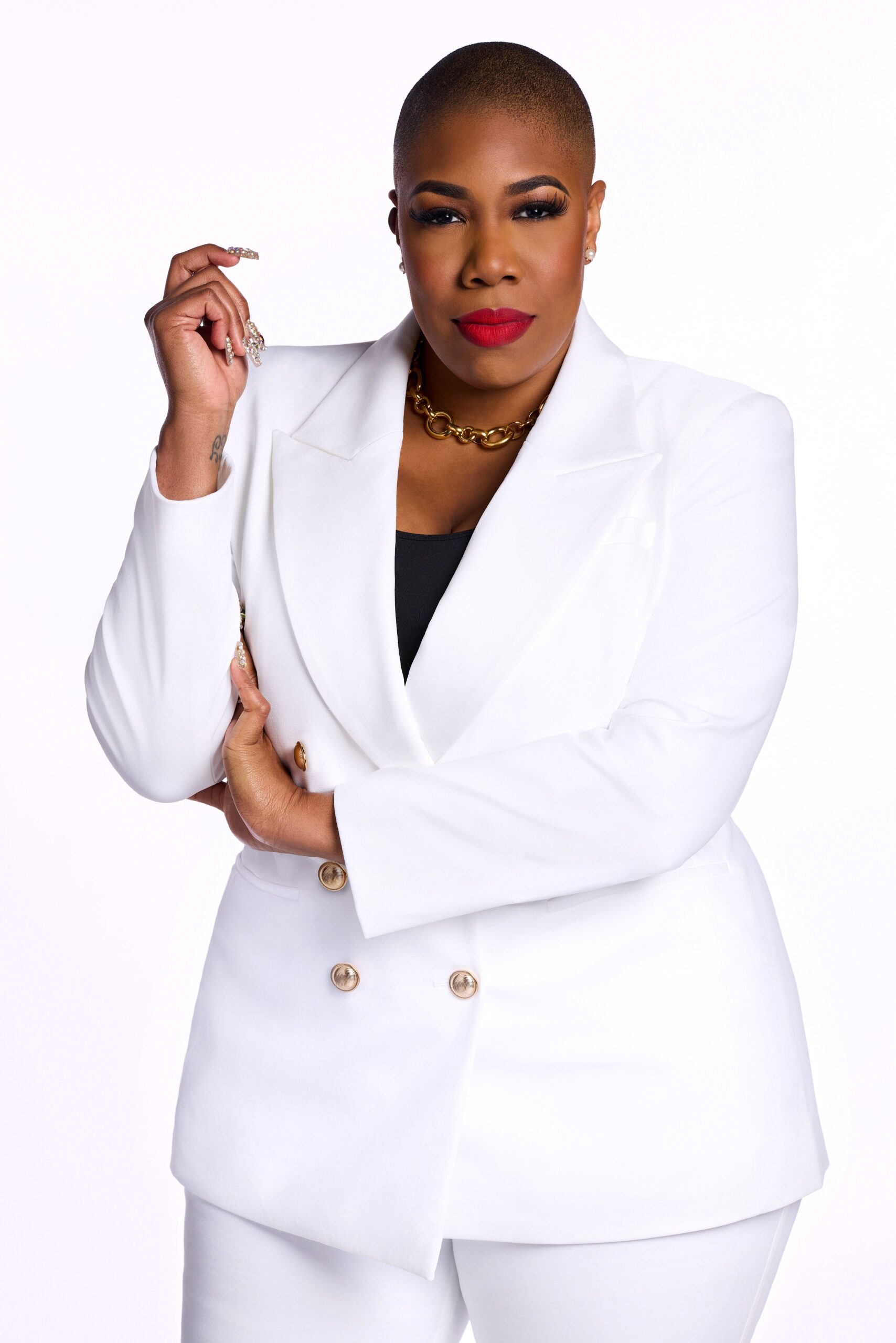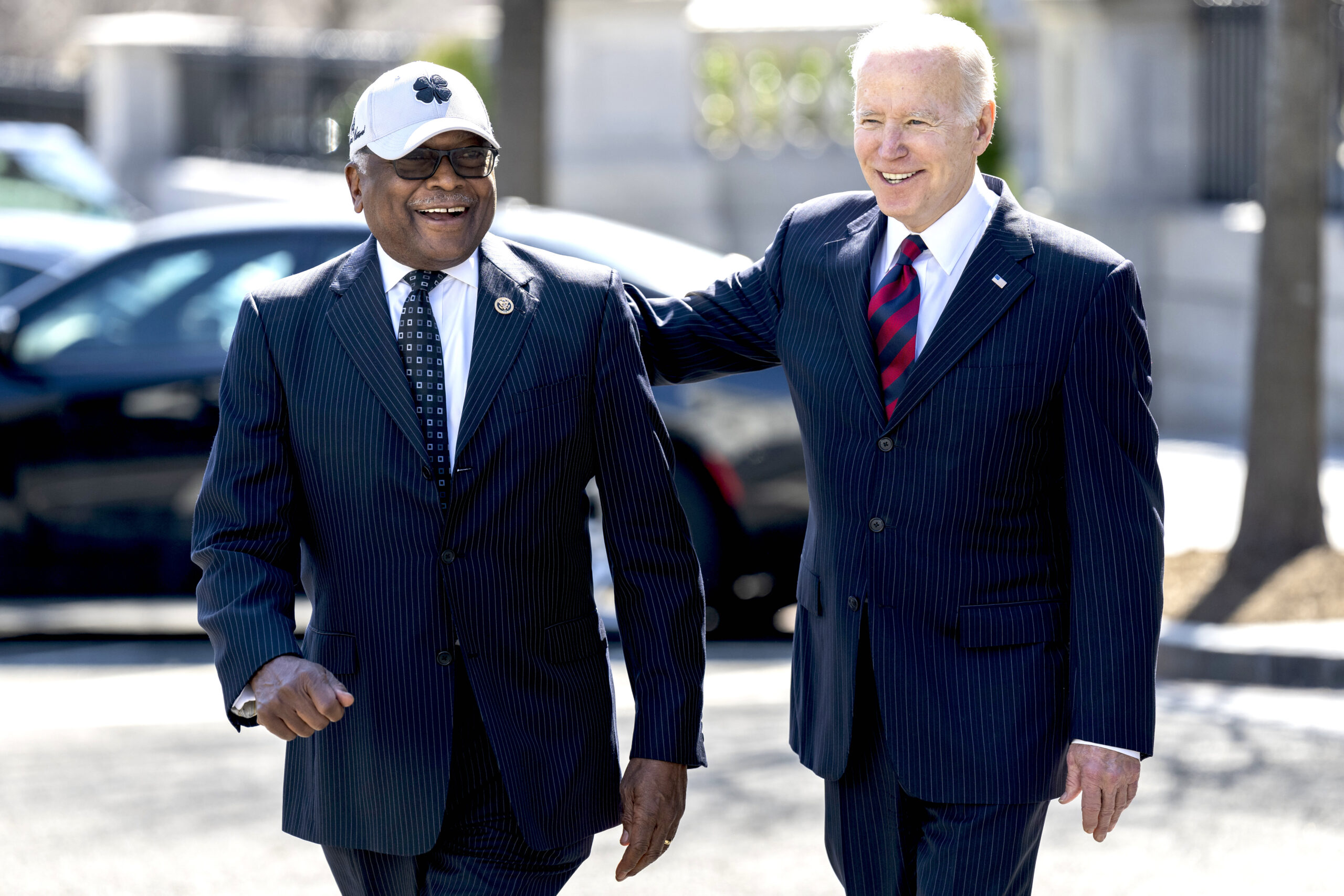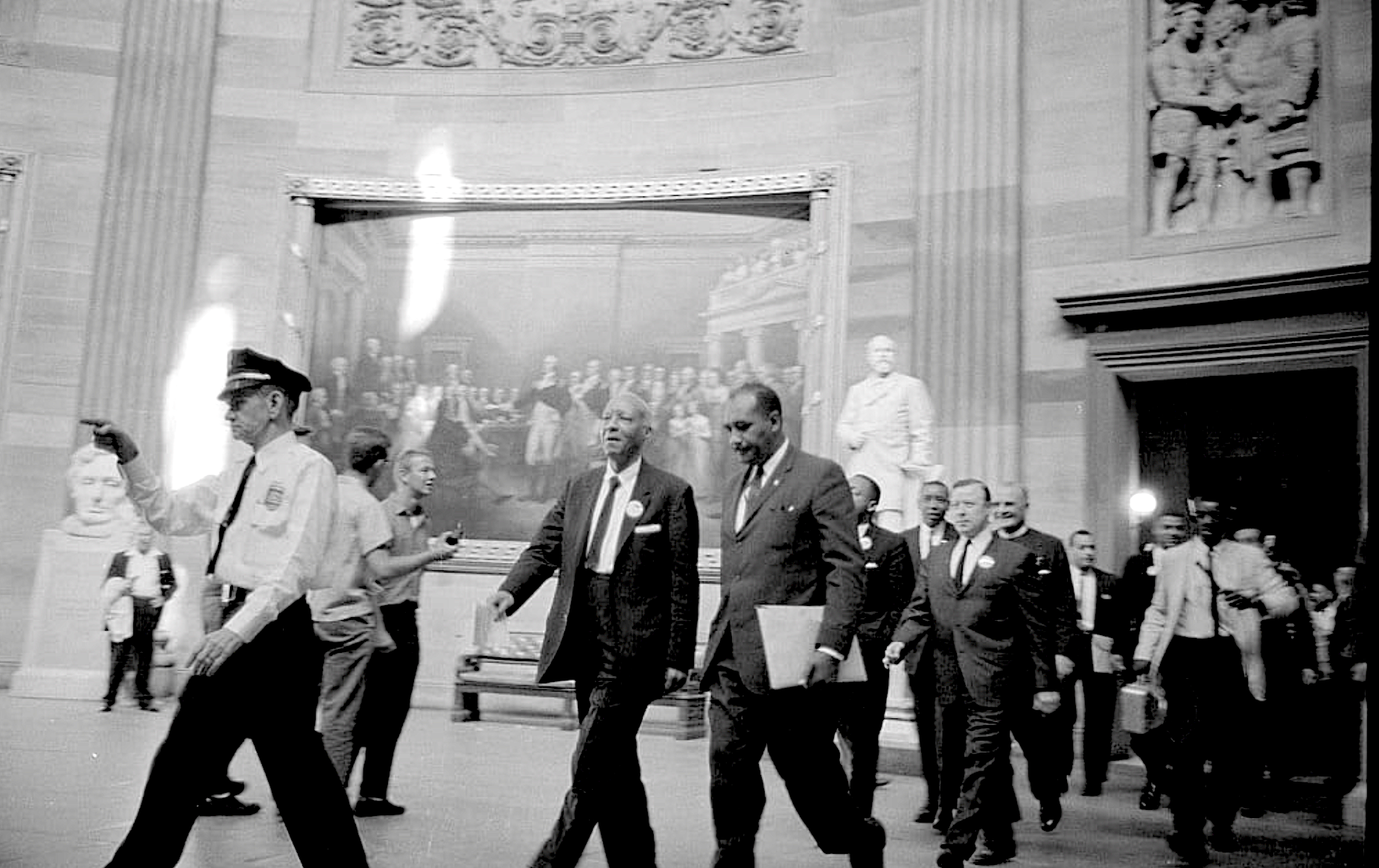Electoral politics is about power, leverage and quid pro quo, writes Wilmer J. Leon, III. What are Black supporters of Kamala Harris getting in exchange?

Vice President Kamala Harris addressing Defense Department staff at the Pentagon on Feb. 10, 2021. (DoD/Lisa Ferdinando)
By Wilmer J. Leon, III
Popular Resistance
“Power without love is reckless and abusive, and love without power is sentimental and anemic. Power at its best is love implementing the demands of justice, and justice at its best is power correcting everything that stands against love.” — Martin Luther King Jr., 1967, “Where Do We Go From Here?”
 Over the past few weeks, the lack of fervor for Democrats surrounding the 2024 election has changed dramatically. President Joe Biden has stepped aside and Vice President Kamala Harris has taken over as the presumptive Democratic presidential nominee. According to her campaign, within 36 hours of Biden announcing his withdrawal, Harris raised more than $100 million, including $81 million in the first 24 hours.
Over the past few weeks, the lack of fervor for Democrats surrounding the 2024 election has changed dramatically. President Joe Biden has stepped aside and Vice President Kamala Harris has taken over as the presumptive Democratic presidential nominee. According to her campaign, within 36 hours of Biden announcing his withdrawal, Harris raised more than $100 million, including $81 million in the first 24 hours.
A record number of organizations run by and in support of African American women joined a “Win With Black Women” call to focus on a new future for voter mobilization. On this call, it is reported that there were 44,000 attendees — with 50,000 more listening on other platforms. It is reported that this call raised $1.5 million for Harris’ campaign.
In a New York Times Op Ed in early July, Bill Clinton surrogate James Carville stated Democrats can’t replace Biden,
“…by anointing Vice President Kamala Harris or anyone else as the presumptive Democratic nominee. We’ve got to do it out in the open — the exact opposite of what Donald Trump wants us to do.”
Contrary to Carville’s sentiment, many African American women such as political strategist and commentator, Symone Sanders-Townsend, challenged the Democratic Party by questioning if they are afraid to have an African-American woman at the top of the ticket.

Sanders-Townsend in 2022. (SDS2020, Wikimedia Commons, CC BY-SA 4.0)
The politics of the African American community must mature. It has to shift away from the identity politics of phenotype and gender and focus on policy. What are all of those who “are with her” demanding? How are they leveraging their power to ensure that not only are “we with her” but from the policy output perspective, “she’s with us?” As the adage goes, “why buy the cow when you can get the milk for free?”
After the disastrous June 27 debate with former President Donald Trump, Biden faced an onslaught of calls to withdraw from the 2024 presidential race. In mid-July, he met with members of the Congressional Black Caucus (CBC) and other House Democrats. Rep. Jim Clyburn (D-S.C.) came out of the meeting reaffirming his support for Biden by proclaiming, “We’re ridin’ with Biden.”
Electoral politics is about power, leverage and quid pro quo. What concessions did Clyburn get from Biden for that endorsement? What demands did he put on the table? Where was the House Democrats’ or the CBC’s version of a “Project 2025” type document that they demanded Biden adopt?
Did Clyburn say, “look Mr. President, you either put the full weight of the bully pulpit behind the “John Lewis Voting Rights Act,” the “George Floyd Policing Act” and the elimination of Cop Cities or we will leave the meeting and tell the public that you fell asleep in the middle of the meeting? Probably not, and their endorsement put them on the wrong side of history, again!
It is imperative that the Democratic Party not only change the messenger, but also change the message. What does Harris, the presumptive nominee, stand for? What policies that directly affect the African American community and other communities of color will she support and champion? Harris’ run for office must be based on policy, not just the fear of another Trump presidency.
Domestic Questions
On the domestic front, African American voters should demand to know Harris’ position on “Cop Cities.”
What will a Harris administration do to ensure the passage of the “John Lewis Voting Rights Act” and the “George Floyd Policing Act?”
What will a Harris administration do to seriously address the wealth disparity between white and Black Americans? This disparity has grown over the past four decades. In 2021, the typical white household had 9.2 times as much wealth as the typical Black household — $250,400 vs. $27,100.
What will the Harris administration do to ensure that Social Security is not only protected but enhanced? Social Security is especially important to people of color because they are less likely than white Americans to have pensions or retirement savings. Among seniors, Social Security is the sole source of income for 33 percent of African Americans.
Foreign Policy Questions

Clyburn with Biden in Washington after signing the Consolidated Appropriations Act of 2022, which in addition to regular allocations of public funds, provided emergency assistance to Ukraine, March 15, 2022. (White House/Adam Schultz)
On the foreign policy front, what will a Harris administration do to end the U.S. support of the genocide in Historic Palestine? Polls show that a majority of Americans disapprove of Israel’s actions in Gaza. A recent Gallup poll found that 55 percent of respondents disapproved of the Israeli military’s actions in the Gaza Strip. “Approval has dropped from 50 percent to 36 percent since November.”
What will a Harris administration do to end the U.S. proxy war in Ukraine? According to a new survey from the Harris Poll and the Quincy Institute, roughly 70 percent of Americans want the Biden administration to push Ukraine toward a negotiated peace with Russia as soon as possible.
If democracy is truly on the ballot as both Biden and the vice president claim, why don’t they listen to “We the People” and bring an end to these atrocities? Americans need to demand that our elected officials are beholden to the interests of “We the People” and not continue to use our tax dollars to further enrich their military industrial complex benefactors.
These are examples of why African American voters and people of color across the country need to show up and show out at the ballot box in greater numbers than they did in 2008 for Barack Obama and four years ago for Joe Biden.
But, when you stand up, show up, and show out in your Greek paraphernalia, understand why you are there and what you are expecting and demanding for your vote. African American voters need to leverage their political capital and expand their perspective beyond identity politics.
Ronald Walters wrote in White Nationalism Black Interests – Conservative Public Policy and the Black Community,
“… if a race is dominant to the extent that it controls the government of the state — defined as the authoritative institutions of decision making — it is able to utilize those institutions and the policy outcomes they produce as instruments through which it also structures its racial interests … Given a condition where one race is dominant in all political institutions, most policy actions appear to take on an objective quality, where policy makers argue that they are acting on the basis of ‘national interests’ rather than racial ones.”
It’s not about a woman of color; it’s not about “Skee Wee” and the “Divine 9,” the nine historically Black sororities and fraternities. It’s not about a graduate of an HBCU — historically Black college and university — and the Cha-Cha and the Electric Slide. It’s not about the shallow politics of phenotype.
Articulate a Vision, Make Demands

A. Philip Randolph, front left of the group of civil rights leaders following the police officer on their way to Congress during the March on Washington, 1963. (Marion S. Trikosko, Library of Congress)
Electoral politics is about policy and policy output for particular constituencies. Once the community casts its votes and puts her in office, is the community willing and committed to holding the Harris administration accountable for accomplishing the mission that she was sent there to accomplish? Well, if you don’t articulate a vision and demand a mission, how will she be able to accomplish them? The responsibility is not on her, it’s on us!
Understand this, those who dominate the political institutions are going to operate in a manner that protects their interests.
Remember how A. Philip Randolph described President Franklin Delano Roosevelt’s response to their meeting in September 1940 in which Randolph pressed for equal employment opportunity and desegregating the armed forces. After listening to Randolph’s problems and solutions, FDR replied:
“Most of his constituents always came with grievances, but in order to get them resolved, they made me do it; therefore, you have to make me do it.”
Following that meeting, Randolph pressured Roosevelt for better war-time jobs for Blacks with the March on Washington Movement, which led to FDR signing Executive Order 8801 of June 1941 prohibiting discrimination in the defense industry.
Randolph went on to conceive the historic March on Washington of 1963, which built support for the 1964 Civil Rights Act.
Voting for symbolism might make you feel good in the moment but if you don’t demand anything, you won’t get anything. Once the celebration ends and those champagne bottles are empty, what are you left with? Empty bottles! If “you are with her,” what are you willing to force her to do? If these questions make you uncomfortable, is it possible that your blind support is reckless, abusive, sentimental and anemic?
Dr. Wilmer Leon is a nationally broadcast radio talk-show host. Author of Politics Another Perspective. Host of Connecting the Dots w/ Dr. Wilmer Leon. Go to his web page or email: wjl3us@yahoo.com and Dr. Leon’s Prescription at Facebook.com © 2023 InfoWave Communications, LLC.
The original version of this article was published by Popular Resistance.
Views expressed in this article may or may not reflect those of Consortium News.

Having watched Wilmer Leon several times, I would not have expected such a shallow article from him. By counseling Black
people to vote Democratic for the umpteenth time, he tells them to do the one thing that will make the Democrats take them
for granted and give them nothing in return. This is really elementary. Doesn’t Wilmer Leon understand it? If not, maybe he
should read some writers who do, for example Margaret Kimberley. Or just read some of the comments to this article. Fortunately
most of the commenters understand perfectly well who owns Harris and whom she answers to.
The D party has no problem with your race, religion, gender, or sexual orientation. BIPOC? LGBTQ? Fine. As long as you qualify as Ivy League elite or the equivalent–whatever establishes you as superior, as deserving to rule, and sets you apart from the unimportant and indistinguishable masses, people who don’t matter.
Dr. Leon has repeatedly made similar arguments by asking just who it is that government officials like Obama, Harris, and Jeffries really represent. He asks us to look closely at whose interests are served by their attitudes, policies, and actions.
Today’s (8/5/24) “Seattle Medium” (a service for Seattle’s African-American and BIPOC communities since 1970) has an important op ed by Dr. Leon on U. S. foreign policies. On the function of what he calls “minstrel diplomacy” in trying to maintain a failing Western empire when the reality is a shift away from a unipolar world. He says flat out that “the government is lying to you…so Americans will believe that more us taxpayer dollars need to be sent to Ukraine and Israel while American infrastructure disintegrates.” This includes “using Black faces to explain and rationalize racism/white supremacy in order to make the audience more comfortable with and receptive to the message.” No matter the face, it’s still the same old structures of empire, its racist and imperialist foundations intact.
Kamala Harris was the front-person for prison-for-profit in California.
Prison-for-profit institutions are a contemporary form of slavery. They selectively and predominantly enslave Black men, though by no means exclusively. As might be imagined, such businesses are cross-invested in other sorts of borderline and straightforwardly criminal pursuits.
To do this, Harris must be an owned commodity, someone such institutions can trust to obey and keep her head down. She cannot be your president, though she might wind up as someone else’s.
I think the only thing that Democrats have to run on is that they are not Trump. The fear of another Trump term frightens most Democrats so they will accept whatever comes along to keep Trump out of office. Voting for Harris is basically a vote out of fear of Trump.
No offense, Dr. Leon, but, we could do w/o “a spoonful of sugar, to sweeten the blow,” i.e., “President Joe Biden has stepped aside and Vice President Kamala Harris has taken over as the presumptive Democratic presidential nominee.” (Wilmer J. Leon III)
Imo, the November 2024 $election, NOT a fair & square Election, none of ‘em are, calls for a dose of reality, i.e., “JRBiden didn’t just “step-aside;” JRBiden’s Donor$ were 100% turned off by JRBiden! Consequently, BIDEN’s Donors, turned off the $pigot! HARD $TOP!!! And, turned up the heat to “dump” JRBiden. Forty-Seven (47) minutes later, “Done & Dusted!” He, GONE! Trumped by Harris.
Hence, the focus on Comma La Harris’ “Catfi$hing” skill set, trolling, for “The Catch of The Day!”..i.e., “within 36 hours of Biden announcing his withdrawal, Harris raised more than $100 million, including $81 million in the first 24 hours.”
“Win With Black Women” call to focus on a new future for voter mobilization.” Saaaay what? “a new future,” w/o JRBiden. That’s f/key. CRUCIAL to the DNC’s $urvival!!! Rumor is, Harris’ V.P., waltz’ in, via video, tomorrow, 8.6.24.
It’s black & white, “Democracy” is NOT on November’s, 2024 ballot. The battle is between “Code Blue,” Harris + a white Democrat male; &, the Orange Crush: Trump & Vance. The Consumers’ Options independent of the Duopoly, Dr. Stein, Dr. West, RFKennedy, Jr., Joseph Kishore & Jerry White.
“Harris’ run for office must be based on policy, not just the fear of another Trump presidency.” (Wilmer J. Leon III)
Not for nothing; but, *“The only thing we have to fear, is reality, itself,” i.e.,“Harris’ run for office,” is as scandalous as HER four (4) years as Biden’s Vice President covering up JRBiden’s extreme physical & mental decline, his perverted public behavior & his corrupted domestic & foreign “policies” i.e., Shield HIM! Shuffle HIM! Screw THEM, “We Did It, Joe.”
Imo, November’s 2024 $election Election, IS about “a woman of color,” Comma La Harris, a chameleon, w/accents. A “FRAUD!” Hence, the refrain, “she ain’t one of us.” And, everybody’s guessing, HER V.P., will be?!? Fingers crossed, “Once the community casts its votes and,” Comma La Harris gets HER fraudulent jackass handed to HER; outta office she be; and, “we, the people,” can move forward, peacefully, w/o the DNC’s Hors d’War threatening to “nuke” planet Earth.
Onward & Upwards. Ciao
This article expresses an interesting and accurate perspective; unfortunately, one not shared by politicized African American leaders and organizations whose votes and souls are bought and paid for but only with tokens.
Kamala’s an international embarrassment, and for that matter, a national embarrassment. Come to think of it, so’s Trumpenstein.
The American empire is being eclipsed by the rising Sino-Russian axis of multipolarity. Instead of picking fights and genuflecting to Israeli psychopathology, our leaders should be fostering peaceful and profitable relations with these two rising titans.
Kamala has the same powerful owners as Biden. She will do as they tell her. It’s astonishing how so many people can pretend that is not the case and project onto her their wishes for what they hope she will do. The same wishes were projected onto Obama. How did that turn out? We are going to have to dump the big money owned parties if we want fair elections.
Yes agreed. We do have a candidate who will work for “We the people” his name is RFK jr. Read his platform, forget the mainstream media lies and fabrications and elect a true independent president beholden to the American people
Kamala clearly was not chosen by the Democrats back in 2020 to be the nation’s VP (and thus primary claimant to make the run for Potus this year) on the basis of her intelligence, wide scope of life experiences, organisation and articulation of her thoughts, personal standards, life principles and philosophies that would hopefully provide the greatest good for the greatest number of American citizens.
In fact, her speeches and debates are delivered with the finesse and exactitude of a “Salad Shooter” or a “Vegimatic,” the aimless and rapid distribution of her verbiage (like a blizzard of flying plant fragments) winning her creations the genre of “word salads.” She was not chosen as the so-called Left’s great thinker, doer and leader on the basis of any of her alleged thought processes, but rather near entirely on the basis of the color of her skin. And even that required a critical re-write of her personal biography.
Sorry, she may bring the salads to the Democratic “Party,” but the Deep Dems made sure she brings lots of baloney as well. Don’t go into their smoke-filled room unless you really want to see how the political sausage is made. It’s a pity that Tulsi Gabbard could not serve as Trump’s proxy in whatever debates he and Kamala manage to schedule before the election. Tulsi sure had the perfect system for completely dismantling Kamala’s entire political career during the Dem primary debates, causing her to drop out of the race actually before any voting was even held. The Trumpster needs to study how others have easily rolled Kamala in previous debates and press conferences. Just calmly stick to the facts, as she is chaos waiting to bloom. The Don was most effective when he handled Genocide Joe with kid gloves during their earlier debate this year. He should display his talents as a negotiator, as we already have quite enough warmongers, thank you very much!
Wilmer Leon hits the main point that Black voters falling in line over Kamala’s supposed identity are giving away their power without even knowing they are, but his delivery is nowhere are powerful and sophisticated as Tim Black’s.
Check out Tim Black’s YouTube channel (Xhttps://www.youtube.com/@Tim_Black – remove the X) if you have not already. He has been analyzing U.S. electoral politics from a Black perspective for almost 15 years and shares many illuminating insights into issues of particular importance to poor, working class, and lower middle class Black Americans.
“within 36 hours of Biden announcing his withdrawal Harris raised more than $100 million, including $81 million in the first 24 hours.” Isn’t money in politics the greatest corruption of democracy? Now KH brags about how much money = how much corruption. Her butt is owned by the money. And the money is owned by the people who own her. Corruption at its zenith.
Absolutely. It’s not about race, it’s about the Have’s and Have Mores vs the rest of us. They just have to get us fighting among ourselves, and are doing a good job of it.
Truer words were never written, Teleman! The money that has gone to her has come from the rich capitalists who would prefer a more ‘normal’ version of screwing us. We all must remember that there is only one story, and that is “The Rich screwing the poor.”